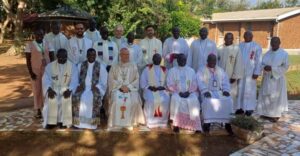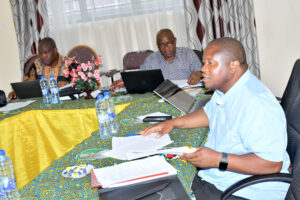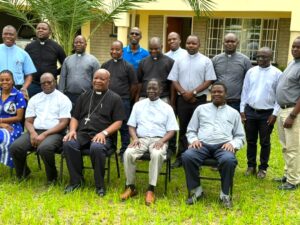KENYA: Bishops Call on the Judiciary, other Key Actors to Play their Role for a “Peaceful Electioneering Process”
Sr. Jecinter Antoinette Okoth, FSSA
Members of the Kenya Conference of Catholic Bishops (KCCB) in their message to Kenyans concerning the upcoming August 9 General Elections, have called on the judiciary and other actors to take key responsibility in playing their role for electioneering process to be peaceful.
In their weekly message dubbed “the Bishops’ Voice,” the prelates highlighted that when democratic processes are well managed by all actors, the outcome becomes “transparent, fair and credible, and consequently legitimate and acceptable to all.” Besides, “the results of any democratic process are as good as the quality of the process adopted.”
Stressing that preparedness is not only left to members of the electoral body but that all other actors in the country should be involved, the bishops said in their Sunday, July 3 message read by Bishop Joseph Obanyi Sagwe, “our experience shows that elections preparedness goes beyond the Independent Electoral and Boundaries Commission (IEBC) and security agencies.”
“There are other players and sectors who are crucial, for a peaceful electioneering process. We specifically call upon these actors, such as the various Churches and Faiths, the Civil Society, the Media in its entirety, the Executive especially the whole Government machinery up to the grassroots and in a special way the Judiciary, to live up to the expectations of integrity, and show impartiality and fairness,” Bishop Obanyi of Kenya’s Kakamega Diocese read the statement on behalf of the Church leaders.
He added, “They must play their role faithfully and fully,” knowing that, for Democracy to thrive, and be the avenue of decision making of the Nation, “everyone, every institution and every official plays a key role. The major democratic process we engage in as citizens is electing leaders in the General Elections.”
Addressing members of the Judiciary on the importance of its preparedness for the possible litigations on August election results, the Kenyan Prelate underscored that a good Judicial system, “protects and gives space to Democracy, hence the Judiciary is the final gatekeeper for justice and for democratic rights and indeed all rights.”
According to members of KCCB, the entire elections process is anchored on law, where all candidates and the electorate are active players who must follow the law which indicates the rights and duties of each one.
They warned that the law must never seem to be applied in different ways to different people, sharing their observation that, “Often we see the application of law enforcement and Justice in a way that it punished the poor caught engaging in violence, while the real culprits, who could be political actors who incited the violence, go unpunished even disguising themselves as defenders of the citizens’ rights.”
“It is therefore important that the law defends everyone, especially the poor, and their rights from the moment of campaigning, to voting, counting of votes and announcing results that reflect the will of every voter,” they said in their Sunday collective statement.
The Catholic Bishops’ concerns to members of the Judiciary is their preparedness and capability to do all what it takes, to handle all emerging electoral cases with “speed and fairness, aware of the stakes.”
“The courts should prepare themselves to discharge their mandate in a manner that brings honor to the disputing parties, to the country but especially in a way that the ordinary voters will see their voting exercise respected,” the bishops said in their message and continued, “Besides, a fair and transparent ruling builds the confidence of Kenyans in their own institutions.”
Based on the bishops’ concerns, they asked the judiciary “to set a time limit upon which all electoral cases should be resolved to avoid delayed justice for candidates and their supporters, maybe a 100 days to conclude petitions.”
To the civil society and faith organizations the Church leaders narrated they are critical non-state actors who have a right to monitor the progress of the on-going electioneering campaigns and elections, “to ensure justice prevails at all times.”
“Their monitoring tasks involves among others reporting on voter bribery, flagging politicians who incite people against each other, highlighting malpractices, and promoting a spirit of democracy,” reads an excerpt of the Sunday 3 statement.
On the other hand, the media “must be sharp in calling out individuals violating the electoral law and must avoid favouritism.” At the same time the prelates called Religious leaders and Religions to remain impartial for the sake of their followers, who have divergent views so as to maintain peace among their followers.
“We trust that our Judiciary will be our first and last defender in the line of seeking justice,” they said in their concluding remarks adding that, “Election results are emotive and the Judiciary should uphold Solomonic wisdom, interest of the lowly, fair interpretation of the law and the spirit behind every article of the law to ensure this year’s General Elections strengthen our resilience towards a just society.”


